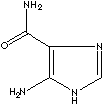5-AMINO-IMIDAZOLE-4-CARBOXAMIDE
PRODUCT IDENTIFICATION

H.S. CODE
TOXICITY
AICA; Aminoimidazole Carboxamide; Diazol-C;
5-Amino-1H-Imidazole-4-carboxamide; 5-Aminoimidazole carboxamide;
CLASSIFICATION
PHYSICAL AND CHEMICAL PROPERTIES
REFRACTIVE INDEX
stable under ordinary conditions.
APPLICATIONS
5-Amino-Imidazole-4-carboxamide is used as an intermediate for the synthesis of drug especially for antineoplastics used to treat a specific type of cancer of the brain (Temozolomide)
APPEARANCE
ASSAY
98.5% min
pass ( 5% aq. solution)
HEAVY METALS
20ppm max
- Triazole: An analog of imidazole.It has three nitrogen atoms and two carbon atoms at nonadjacent positions in the ring system.
- Pyrrole: An analog of imidazole. It has only one nitrogen atom in the ring system. Pyrrole ring system is involved in coloured products (green pigment, chlorophyll; red, hemoglobin; , blue, indigo) in nature.
- Pyrroline: A pyrrole in which one of the two double bonds are hydrogenated.
- Pyrrolidine: The saturated tetrahydropyrrole, a part of the structures of amino acids (proline, hydroxyproline and hygrine).
- Pyrazole: 1,2-Diazole (Imidazole isomer). The nitrogen positions are 1 and 2. It is not found in nature
- Pyrazolone: Pyrazole analog with ketone group at 5 positon
- Oxazole: an analog of imidazole. The nitrogen atom in position 1 is replaced by oxygen.
- Isoxazole: an analog of pyrazole. The nitrogen atom at position 1 is replaced by oxygen.
- Isothiazole:an analog of pyrazole. The nitrogen atom at position 1 is replaced by sulfur.
|
|
|
|
|
|
1,2,4-Triazole |
Pyrrole |
1-Pyrroline |
3-Pyrroline |
|
|
|
|
|
|
Pyrrolidine |
Pyrazole |
Pyrazolone |
Oxazole |
|
|
|
|
|
|
Isoxazole |
Isothiazole |
Benzimidazole |
Thiabendazole |











